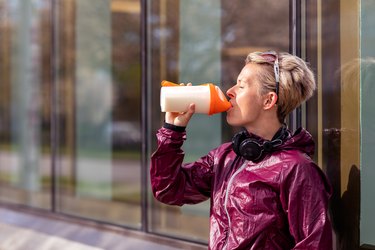Can Drinking Muscle Milk Help You Lose Weight?

Peter Berglund/E+/GettyImages
An often-important part of many weight-loss diets (and balanced diets, in general) is incorporating lean sources of protein.
While the best way to do this is through eating protein-rich foods like meat, fish or tofu, there are also protein powders and shakes on the market to help you increase your protein intake.
Video of the Day
Video of the Day
One popular brand is Muscle Milk, made by the company CytoSport, which sells ready-to-drink shakes and protein powder in flavors like chocolate, vanilla, strawberry and more — all with different amounts of protein. Some are even advertised as meal replacements to help you lose weight.
But can drinks like Muscle Milk really help you lose weight?
Here, we’ll learn about the nutrient content of popular Muscle Milk products, whether they’re a good weight-loss solution and the potential risks of using protein supplements.
Tip
Talk to your doctor before trying any diet or weight-loss supplement. They can help you figure out if weight-loss supplements are a safe and healthy choice for you based on things like your health status, medical history and medications.
Muscle Milk Nutrient Content
Most Muscle Milk shakes have anywhere from 20 to 40 grams of protein per serving, mostly from milk protein isolate, which is a combination of two milk protein sources: casein and whey, per the U.S. Dairy Export Council. (Some of the brand’s powder products are made with just whey protein.)
This amount is a little less than the average adult’s daily protein requirements, which are about 50 to 175 grams per day for a 2,000-calorie diet, per the Mayo Clinic.
When it comes to calories, the exact amount will depend on the type of Muscle Milk shake you choose:
- Muscle Milk ZERO has about 100 calories per serving
- Muscle Milk Genuine has about 160 to 170 calories per serving
- Muscle Milk Pro Advanced Nutrition has about 210 to 220 calories per serving
For example, a 14-ounce container of Muscle Milk’s Genuine Chocolate Protein Shake has about 170 calories and 25 grams of protein, while the ZERO Vanilla Crème Protein Shake has about 100 calories, zero grams of sugar and 20 grams of protein per 11-ounce container.
Here’s a nutrient breakdown of these two popular products, per Muscle Milk’s website:
Muscle Milk Genuine Chocolate Protein Shake (14 oz)
|
Calories |
170 |
|
Total fat |
5 g |
|
Saturated fat |
1 g |
|
Cholesterol |
10 mg |
|
Sodium |
260 mg |
|
Total carbohydrates |
11 g |
|
Dietary fiber |
6 g |
|
Sugar |
0 g |
|
Protein |
25 g |
|
Vitamin D |
8 mcg |
|
Calcium |
330 mg |
|
Iron |
2.2 mg |
|
Potassium |
780 mg |
|
Vitamin A |
230 mcg |
MuscleMilk.com
Muscle Milk ZERO Vanilla Crème Protein Shake (11 oz)
|
Calories |
100 |
|
Total fat |
1 g |
|
Cholesterol |
10 mg |
|
Sodium |
170 mg |
|
Total Carbohydrates |
6 g |
|
Dietary fiber |
4 g |
|
Total sugar |
0 g |
|
Protein |
20 g |
|
Vitamin D |
7 mcg |
|
Calcium |
280 mg |
|
Potassium |
460 mg |
|
Vitamin A |
270 mcg |
|
Vitamin C |
18 mg |
Musclemilk.com
Can Muscle Milk Help You Lose Weight?
There is little evidence showing that Muscle Milk (or any protein shake, for that matter) can specifically help you lose weight. If anything, drinking too much protein could actually cause you to gain weight, per the Mayo Clinic.
If you drink the suggested serving size (likely only once per day), though, in combination with a balanced diet and exercise, you could lose weight. Drinking protein shakes without making any lifestyle changes, however, is not likely to produce weight-loss results.
On top of that, if you were to drink only protein shakes (instead of eating full meals) you could lose weight in the short term, but it wouldn’t be sustainable — i.e., you’d have to start eating solid food again and would likely gain the weight back. Plus, you’d miss out on important nutrients from whole foods, per the Mayo Clinic.
That’s why getting the majority of your protein through food (and sprinkling in protein supplements here and there to help you reach your goals) is a better approach when it comes to weight loss.
How Protein Helps With Weight Loss
Although there’s no specific benefit to drinking Muscle Milk or other protein supplements when it comes to weight loss, getting adequate protein can help when you’re trying to lose weight.
In fact, eating a high-protein diet is considered a safe tool for weight loss that may help prevent obesity and obesity-related diseases, according to a September 2020 article in the Journal of Obesity & Metabolic Syndrome.
Here’s why:
1. You Feel Fuller Longer
It’s true that when your body gets enough protein, it feels satiated for longer, which could help you stick with your diet plan, per Harvard Health Publishing.
While there isn’t much new research about Muscle Milk’s main protein — milk protein isolate — there is one older July 2013 review in Advances in Nutrition that found its main component, casein, takes longer for your body to digest than whey protein. This could, in turn, help you avoid food cravings and stick with your weight-loss efforts.
2. It Helps You Build Muscle and Burn Fat
Getting protein before or after some form of resistance training could help with muscle protein synthesis (i.e., building muscle) and fat loss, per a June 2017 entry in the Journal of the International Society of Sports Nutrition.
Ultimately, Muscle Milk itself cannot make you lose weight, but drinking proper portions of it, along with smart nutrition, exercise and other lifestyle changes, could help you in your weight-loss efforts.
Is Muscle Milk a Good Meal Replacement?
Even though there are many different Muscle Milk products, not all of them can (or should) be considered a meal replacement.
For example, the brand’s Pro Advanced Nutrition shakes have about 6 grams of fiber and 18 essential vitamins and minerals, but they don’t necessarily have enough carbohydrates and fats to be considered a full meal.
And other products, like the ZERO or Genuine shakes, do not offer the same amount of vitamins and minerals that whole foods would have, per the products’ nutrition labels.
All that said, if you’ve been cleared by your doctor to use meal-replacement products (for a low-calorie diet, for example) some Muscle Milk products could then be considered meal replacements for you. But this will all depend on your calorie and vitamin needs, your level of physical activity, your metabolism and your overall health.
Bottom line: Read the product labels and talk to your doctor before trying Muscle Milk as a full-on meal replacement.
Can Drinking a Lot of Muscle Milk Improve Your Athletic Performance?
Drinking a serving of a protein shake before or after working out may help your body build muscle. But drinking more than the serving size will not actually help your athletic performance.
In fact, there’s no scientific evidence to show that exceeding your body’s protein needs will actually increase performance, per the Mayo Clinic.
Additionally, your body can’t store protein, so once your body’s daily needs are met, any extra protein is burned or stored as fat, not muscle, per the Mayo Clinic.
Potential Downsides of Muscle Milk
There are a few reasons Muscle Milk may not be the best option for getting protein when you’re trying to lose weight:
1. It Has Artificial Sweeteners
One potential negative of Muscle Milk is that it uses artificial sweeteners to give it its flavor. The two types include: acesulfame potassium (often sold as Sweet One) and sucralose (often sold as Splenda), per the brand’s website.
While there is little evidence to show that artificial sweeteners cause weight gain in people long term, there are some small studies in animals that point to acesulfame potassium causing weight gain and an imbalanced gut microbiome, per a June 2017 study in PLOS One. Much more research is needed to see if it has the same effect in humans, though.
Beyond that, eating things with artificial sweeteners (in large amounts) may also not be the best for your health. Some research suggests it could increase your risk of stroke and heart disease, per the Mayo Clinic.
There’s also ongoing research potentially linking it to negative effects on the brain, taste receptors (causing you to feel hungrier and crave sweeter items) and the gut microbiome, per the University of Washington.
Tip
The acceptable daily upper limit for both acesulfame potassium is 15 milligrams per kilogram of body weight, and the limit for sucralose is 5 milligrams per kilogram of body weight, per the FDA.
2. The Powders Are Not Regulated by the FDA
Because protein powders are considered dietary supplements, their labels are not heavily regulated by the Food and Drug Administration. This means the FDA does not review or test products (and the claims made on labels) before they hit the market, per Colorado State University. This also means the labels may not accurately list the nutrition value of the product inside.
Muscle Milks’ ready-to-drink protein shakes are regulated by the FDA, however, because they have a nutrition facts label on the back, per Colorado State University.
3. Its Ingredients May Cause Stomach Upset
Because Muscle Milk is made with milk protein isolate, those with a dairy intolerance or milk allergy may experience stomach issues from drinking it. In fact, any milk-based protein could cause stomach discomfort (i.e., bloating, gas or diarrhea), per Harvard Health Publishing.
Are There Heavy Metals in Muscle Milk?
A July 2010 test by Consumer Reports found four heavy metals (arsenic, cadmium, lead and mercury) present in Muscle Milk protein powder, which exceeded the USP’s “safe” limit. These amounts were considered harmful when three daily servings were taken. Three daily servings of Muscle Milk vanilla crème also exceeded the USP limits of lead and arsenic, while three servings of Muscle Milk chocolate protein shake had arsenic approaching the USP limit.
On a broader scale, a 2018 report by the nonprofit The Clean Label Project tested 134 top-selling protein powders in the U.S., and found 53 had some amount of lead, arsenic, cadmium, mercury and BPA (a substance used to make plastic). These substances have been linked to the development of cancer and other serious health conditions, per Harvard Health Publishing.
Keep in mind these studies are older and more tests need to be done on Muscle Milk products (and protein products in general) to determine if these potentially harmful substances are still present.
A good rule of thumb is, if you’re going to use a protein powder, make sure it has a certification from a reputable source, like the USP, NSF or NSF Certified for Sport, and read the labels carefully to make sure you’re eating the right serving size (to avoid exceeding the upper limits on these substances).
How to Add More Protein to Your Diet
Ultimately, it’s best to get the majority of your daily protein from food rather than protein shakes or powders. Instead of solely relying on products like Muscle Milk, try adding these high-protein foods to your daily meals:
- Seafood like fish, shrimp and scallops
- Lean poultry like chicken or turkey
- Egg whites
- Legumes, including beans, lentils and chickpeas
- Smoothies with Greek yogurt or silken tofu for protein, fruit and leafy green veggies for fiber and sweetness
- Nuts, flaxseeds and chia seeds
How to Safely Incorporate Muscle Milk Into Your Weight-Loss Routine
If you still can’t get enough protein through food to meet your daily needs, and your doctor gives the OK to try Muscle Milk, here are some ways to safely incorporate it into your routine:
- Make sure you’re drinking the suggested serving size just once daily (unless advised otherwise by your doctor).
- Prioritize lean protein and fiber from whole food sources, including things like chicken, fish, nonstarchy vegetables and whole grains. Then drink Muscle Milk as a snack, or before/after a workout.
- Track your calories using a calorie counter app to make sure you’re not exceeding your daily limit by drinking Muscle Milk.
The Bottom Line
Muscle Milk itself won’t make you lose weight, and is not considered a great meal-replacement option. While you can incorporate Muscle Milk (or other protein shakes) into your daily routine, eating high-protein whole foods is the better option for hitting your protein requirements.
If you are going to try Muscle Milk, be aware of the potential downsides and talk to your doctor to see if it’s a safe or healthy protein option for you.




